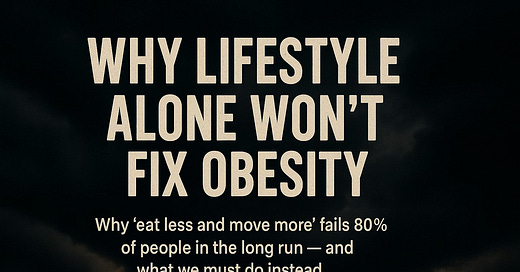Why Lifestyle Alone Won’t Fix Obesity.
Why "eat less and move more" fails 80% of people in the long run — and what we must do instead.
When it comes to nutrition and weight loss, I can probably only say two things with very high confidence:
Exercise & nutrition are, hands down, bar none, the best ways of preventing excess weight and obesity.
Exercise & nutrition are awful at managing significant excess weight and obesity over longer periods of time.
Put simply, getting your nutrition and exercise right is a great way to prevent weight gain; it is just a terrible way of addressing excessive weight gain.
Let Me Explain.
Up until very recently, when attempting to address excess weight and excess visceral fat, the primary lever we could pull was using nutrition to induce a calorie deficit.
Low fat, low carb, intermittent fasting, keto, vegan, paleo?
Take your pick.
They all work.
For a while.
And then they don’t.
Over and over and over again, the studies show the same thing.
Diet X results in weight loss at 6 months, and then that weight is progressively regained.
There are a myriad of reasons why this happens.
Failing adherence, changes to appetite, alterations of metabolic rates, etc.
Take your pick.
It doesn’t really matter.
Pretty much everyone ends up back at square one eventually.
It’s at this point that the patient ends up with their doctor, who asks.
“How did things go with the weight loss?”
And the response is almost always the same.
“Really great at first. I lost loads of weight. Then, you know, things happened, and I regained a lot of it, but I know what to do; I just need to keep doing it.”
It is at this point that the doctor usually replies.
“Ok. Well, if you’ve done it before, you can do it again. Hopefully, next year will be better.”
And round and round and round it goes.
Let Me Be Explicitly Clear Here.
Firstly, I do not blame patients for this issue.
The data is crystal clear that long-term sustainable weight loss is exceptionally hard.
It's not impossible, but it's exceptionally hard.
Secondly, up to about 4 years ago, doctors really did not have much to offer beyond saying:
“Watch your diet and try to get more exercise.”
Neither party was being served well by this situation.
Long-Term Weight Loss Data.
Short-term data for weight loss is great. Everyone is a winner at 6 months.
After that, it all starts to fall to pieces.
For lifestyle approaches to weight loss, more than 50% of people will have regained all the weight they lost at 2 years.
By year 5, nearly 80% will have regained all the weight they lost.
By year 9, the chances of losing sufficient weight to move you from the obese to normal weight category are just abysmal.
Females fare a little better here, with 0.8% moving from the obese to the normal weight category.
It’s even worse for males, with only 0.4% achieving the transition.
If you are in the very obese category of BMI >40, those figures drop to 0.14% and 0.07%, respectively1.
If recommending this strategy were a drug or a device, it would never be approved.
But that’s all we had to offer, with the exception of bariatric surgery.
Until Now.
Keep reading with a 7-day free trial
Subscribe to Dr Paddy Barrett to keep reading this post and get 7 days of free access to the full post archives.






